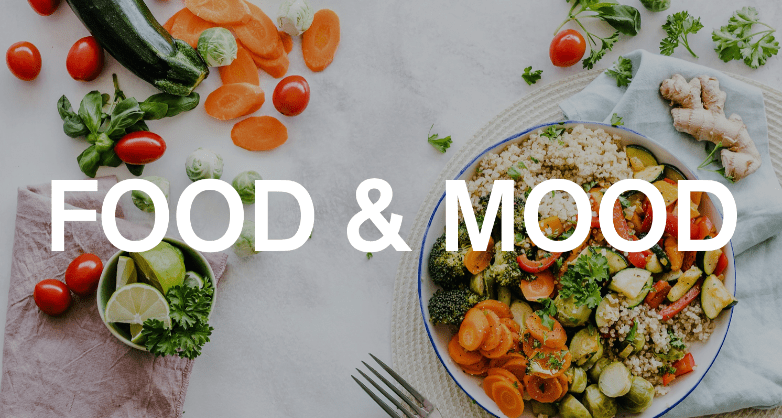
How food affects your mood – Laura Bryan ‘Mind Nourishing’
Visit Laura’s website here.
When we think about mental wellbeing, the immediate reaction is often to think about what’s going on in our head. This is totally logical because that’s where we process our thoughts and emotions. What if I told you though, that the gut has a lot more influence on our mood than we originally thought. In fact, the gut is now being termed as ‘our second brain’.
The community in our gut
You may or may not have heard about the gut microbiome. For those of you that haven’t, this term refers to the TRILLIONS of organisms within our gut such as: bacteria, yeasts, parasites and viruses. The number of bacteria, in particular, is so large that it’s actually estimated that we have more bacteria cells in our bodies than human cells (1). This might make you question ‘who is actually in charge of who here?!’
Although we often think of bacteria as a thing that should be avoided, without these bacteria in our gut we simply wouldn’t be able to survive. Gut bacteria is essential for digestion, our immune system, our metabolism, creating certain vitamins and even producing neurotransmitters! (2)
We now know this ‘second brain’ within our gut is actually responsible for producing around 90% of serotonin (our happy hormone) as well as dopamine (our reward/ feel good hormone) and GABA (our calming, sleep supporting hormone). Not only does the gut create all of these neurotransmitters but the gut is also lined with millions of neurons that can actually communicate to the brain through the ‘vagus nerve’. We don’t really fully understand this communication just yet but it is starting to explain how our ‘gut instinct’ is a real thing.
Supporting your gut
Now that we’ve seen how important our gut bacteria is for our physical and mental health, it is really important that we do all we can to allow it to thrive. Thankfully, there are plenty of things we can do nutritionally to support our gut health.
1 – Eat a range of fibre rich foods
Fibre is essential to maintain a healthy gut microbiome because this handy carbohydrate acts as the fuel for our beneficial bacteria. Unfortunately, in the UK (and within the majority of the Western World) we simply don’t get enough fibre in our diet. On average we only tend to get around 19g of fibre per day where it is recommended we aim for around 30g.
To increase your fibre intake, one of the best things you can do is try to include a wide variety of different fruits and vegetables in your diet. Ideally even try and base your meals around vegetables with at least half of the plate being made up of plants.
Variety is also important here as different types of fruit and vegetables will have different types of fibre. This variety will encourage the growth of different types of beneficial bacteria which is ideal as we know that the healthiest people in the World tend to have the most diverse gut microbiome (3).
Other fibre rich foods also include wholegrains, beans, nuts, seeds and lentils.
2 – Be mindful of your sugar intake
I love chocolate just as much as the next person but unfortunately so do our ‘bad bacteria’. These pathogenic bacteria use sugar as their fuel and if they get fed too often, they are able to thrive leaving it harder for the beneficial bacteria to survive. As our gut can talk to our brain, it is also now being realised that these bacteria can even send messages to your brain to encourage you to eat more sweet things (4)… talk about a viscous craving cycle!
Unfortunately, if we always give into these cravings we can encourage an overgrowth of this type of bacteria. This unbalance (also termed dysbiosis) is often linked with issues like bloating, gut pain, and even constipation or diarrhoea.
Before you panic and think I’m going to suggest never eating cake again…don’t worry! The best thing to do is just be mindful of what you’re eating and notice how it makes you feel. Totally restricting yourself of all things sweet is probably going to end in a huge binge followed by guilt. Start slowly maybe by swapping some goodies like chocolate and biscuits to some more fibre rich sweet options like fruit and notice now you feel. When we start to notice how good we feel when nourishing ourselves properly, it really helps to encourage us to make sustainable long term changes.
3 – Maybe try some fermented foods!
Fermented foods are great for the gut because during the fermentation process they create beneficial bacteria. When we then eat or drink these products we take on the good guys!
Examples of fermented foods/ drinks are things like: sauerkraut, kimchi, kefir and kombucha. Yes they sound strange but they can be a great addition to your diet and are now widely available to buy if you don’t fancy fermenting them yourself. However, if you are buying them, make sure they are ‘raw’ and being kept in a fridge. If not, chances are they might have been heat treated to prolong their storage date which unfortunately kills off the bacteria.
If this all sounds a bit too much you could always cut out the middle man and try a probiotic supplement yourself. Just maybe get a suggestion from a health practitioner who will be able to suggest the right type of strain which is researched for your wanted outcome.
Recap
So to round up, I hope this has inspired you to realise that by making small changes to your eating habits, you could in fact create a healthier and happier future for yourself. What’s also great is that because our microbiome changes so quickly, it means that the positive changes you make to your diet today really can have an impact on how you feel tomorrow.
References
- Sender, R., Fuchs, S. and Milo, R., 2016. Revised Estimates for the Number of Human and Bacteria Cells in the Body. PLOS Biology, 14(8), p.e1002533.
- Jandhyala, S., 2015. Role of the normal gut microbiota. World Journal of Gastroenterology, 21(29), p.8787.
- Valdes, A et al., 2018. Role of the gut microbiota in nutrition and health. BMJ, p.k2179.
- Alcock, J., Maley, C. and Aktipis, C., 2014. Is eating behavior manipulated by the gastrointestinal microbiota? Evolutionary pressures and potential mechanisms. BioEssays, 36(10), pp.940-949.

